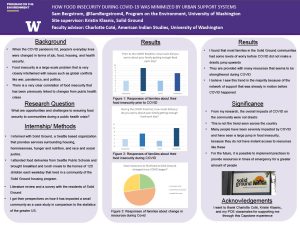How Food Insecurity During Covid-19 Was Minimized by Resources From an Urban Housing Organization
In light of a whole year being affected by COVID-19, it is critical to be able to supply food to those who need it during the difficult times of a global pandemic, by providing resources that are not always available. The Solid Ground food program I participated in helped address the problem of the uncertainty of changes from COVID-19 and how struggles can be mitigated. The aim of my research was based on the food program, to see if there were changes to food services that would increase people’s ability to provide food to their families. The internship focused on delivering breakfast and lunch to school children every weekday who normally get free meals at school but are home because of COVID-19, as well as run a weekly food back to provide additional groceries to those families. In my research, I collected evidence whether this work was valuable by surveying those families to see the changes in how they felt about their families food security before and during COVID19 and what changes they have seen of resources. I found that the resources provided by the housing service were beneficial to those families enough that many did not have much worry about food insecurity and felt like those resources increased since COVID-19 began. The results of this research are meaningful because they helped determine that these efforts are working well for many families and can help provide information for better resources in the future if there is another public health crisis.
